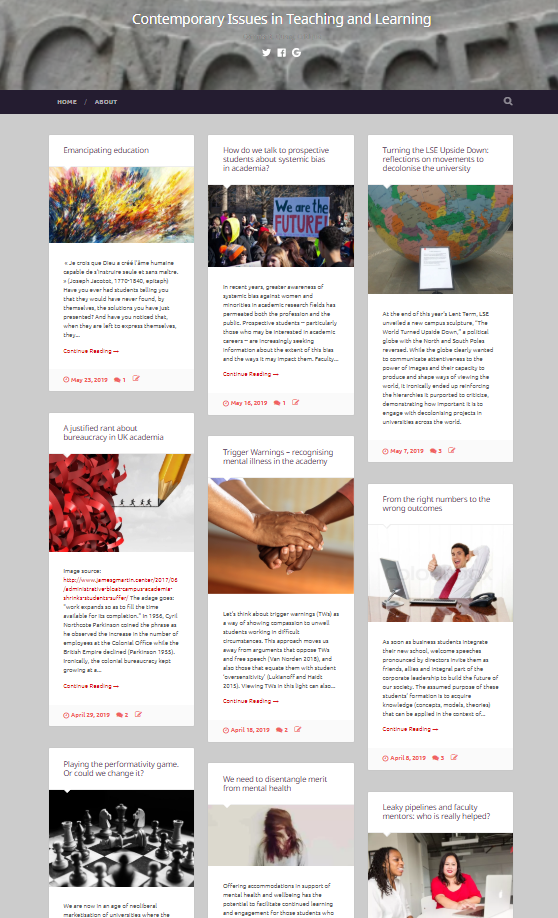In his book, The Enquiring University, Stephen Rowland characterises academic development work in the following way: “Academic development is intertwined with the micro politics of the institution as well as the wider politics of higher education. It is an aspect of academic work that demands courage in the face of pressures to conform from within and beyond the university.”
This statement eloquently sums up the constant, complex, small and large balancing acts that make up the daily fare of academic development work across the UK higher education sector. As academic developers, we are located in liminal, often uncertain, spaces in the academy with a foot in both the academic and institutional strategy camps. Through our work we seek to inform and inspire our colleagues to enhance the education of our students by drawing on an evidence base of education research and scholarly inquiry into good practice in higher education (HE). At the same time, we are charged with supporting the implementation of institutional strategy, strategies which have become increasingly oriented to responding to changes in the external HE landscape – including the Teaching Excellence Framework; the demands of the new HE regulator, the Office for Students; and more recently, the new stringent requirements for HEIs to close attainment gaps through institutional Access and Participation Plans. In line with these changes the work of teaching and learning centres or their equivalents in many universities have been brought ever closer to the strategic priorities of the institution.
This external leverage brings powerful opportunities to influence and effect education change in positive directions. But it also presents very real challenges to our values and identity as academic developers. This conundrum can be summed up as follows: How do we as academic developers retain a critical voice and uphold the values of openness, collegiality and scholarly rigour in this changing institutional environment? How do we support strategic education change programmes while respecting and enabling the disciplinary traditions and cultural norms of our academic departments? How can we push for positive change even if this might involve gently resisting or subtly re-directing the metrics pressure?
In the remainder of this post, I reflect on my experience as head of LSE Teaching and Learning Centre (TLC) for the past three years including some of the challenges and opportunities this has presented. The increasing prioritisation of education in the research-intensive university opens doors for academic developers enabling us to have a stronger influence on the direction of travel of education at the centre and in the departments. If we can get this right (at least some of the time), it is a window of opportunity for us to leverage the new prioritisation of education to work with academic colleagues to review and develop curricula and foster opportunities for active, engaged learning and partnership with our students; to create space for contestation and inquiry; and to support our institutions to respond to the pressures emanating from the new regulatory environment.
I will draw on several examples to demonstrate how my colleagues and I try to manage these complex juggling acts. In 2017-2018 I was asked to lead an LSE-wide review of undergraduate programmes. The review focused on several key objectives including ensuring greater programme coherence so that there is a clearly articulated journey of learning through the three years of study for our undergraduate students, and encouraging a process of assessment diversification – a move away from the strong reliance on end-of-year examinations to enable our students to develop a broader range of analytical and transferable skills through learning, practicing and performing a wider range of assessments. From the outset my colleagues and I were keen to ensure an enhancement, academic-judgement-led ethos to the review. At the same time there was a degree of pressure to deliver measurable outcomes. In as much as this was the case, this initiative posed both an opportunity and a risk to our work: it was an opportunity to share our knowledge and expertise as undergraduate programme teams across the university were obliged to work with us in carrying out this review of their programmes; but at the same time, there was a very real risk that the process of review would be dismissed as a top-down managerialist tool to respond to the latest sectoral tune (and by association our work too) rather than an opportunity to step back and think through the aims, educational objectives and journey of a programme of disciplinary or interdisciplinary study for our students entering higher education in the 21st century. In designing the process of programme review and building in curriculum mapping activities and a review panel dialogue, we tried to create spaces for debate, contestation and gentle persuasion. Through including students as partners on the panels and in the review work, we tried to model and demonstrate the value of student partnership in education work.
We straddle similar tensions in many areas of our work. Through the Postgraduate Certificate in Higher Education (PGCertHE), a requirement for career-track academic staff at LSE and also open to graduate teaching assistants and LSE Fellows, we enable our participants to develop and embed the foundational knowledge, skills and a reflective orientation to their teaching enabling them to be(come) effective social science educators at LSE and beyond. We recognise the ambivalences of some of our participants about ‘having’ to undertake this developmental training. We recognise the tensions and challenges faced by many early-career academics who are strongly committed to the education of their students and are attuned to the attendant responsibility, but we are also mindful that many are living in a world of precarity, uncertain of their future and often – in the context of their teaching – with limited agency to effect change. The introduction last year of a new module, Contemporary Issues in Teaching and Learning on the PGCertHE and the creation of an accompanying blog was in part designed to create a space for the exploration of this complexity and uncertainty.

A third example relates to how we have tried to shape institutional approaches to the reward and recognition of education and educators. In 2016, LSE introduced an education career pathway in line with the majority of universities across the UK HE sector. Over the past three years we have worked incrementally both with the School leadership and with newly appointed colleagues to support the development and embedding of this new role pathway in a context in which the very notion of education-focused roles remains contested by some members of the academic community. We also know that the dearth of education leadership capabilities in our institution impacts on our capacity to respond to the ambitious education change agenda underway at LSE and that colleagues on the education career track have the potential to have a transformative impact on student education. However enacting a new career pathway involves so much more than writing a set of guidelines and accompanying criteria. In 2017, I set up an Education Career Track Network to provide a forum for colleagues in this pathway to express voice, which we can communicate collectively to the school leadership, and also to create opportunities for practice-sharing and education research collaboration. We have also been working to support and develop the more formal cycle of appointment, development, promotion and progression for this pathway including most recently feeding in to consultations over revisions to promotion criteria.
Rowland identifies compliance and contestation as a key fault-line in academic development work. The crux of the matter lies in choosing when and how to comply and when and how to contest while remaining true to the fundamental values that underpin our work. It involves moment-by-moment reflection and interrogation of what it means to have a positive impact on the education of our students. Engaging in those difficult conversations, getting it right and making a difference is a powerful validation of what we do.
Disclaimer: This post is opinion-based and does not reflect the views of the London School of Economics and Political Science or any of its constituent departments and divisions.
Main image: A discussion at an Education Career Track Network meeting/Catarina Heeckt





